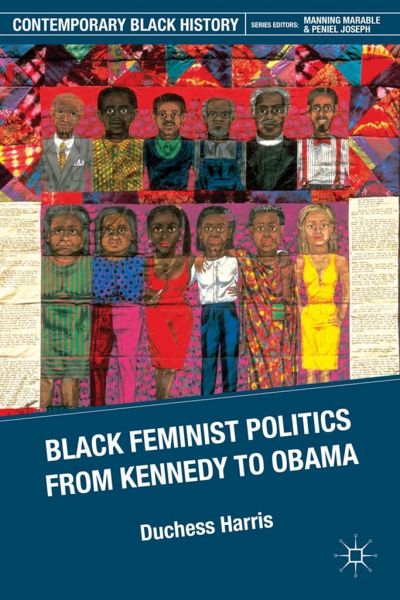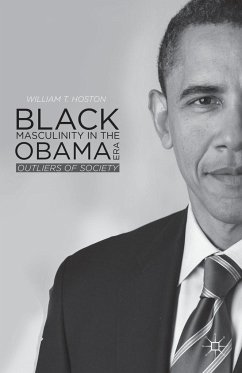
D. Harris
Broschiertes Buch
Black Feminist Politics from Kennedy to Clinton
Versandkostenfrei!
Versandfertig in 6-10 Tagen
Weitere Ausgaben:

PAYBACK Punkte
19 °P sammeln!





Taking an interdisciplinary approach, this book analyzes Black women's involvement in American political life, focusing on what they did to gain political power between 1961 and 2001, and why, in many cases, they did not succeed.
DUCHESS HARRIS is an Associate Professor of American Studies at Macalester College, USA.
Produktdetails
- Contemporary Black History
- Verlag: Palgrave Macmillan / Palgrave Macmillan US / Springer Palgrave Macmillan
- Artikelnr. des Verlages: 978-0-230-11255-1
- 2009 edition
- Seitenzahl: 190
- Erscheinungstermin: 9. Mai 2011
- Englisch
- Abmessung: 216mm x 137mm x 18mm
- Gewicht: 303g
- ISBN-13: 9780230112551
- ISBN-10: 0230112552
- Artikelnr.: 32464086
Herstellerkennzeichnung
Libri GmbH
Europaallee 1
36244 Bad Hersfeld
gpsr@libri.de
"There has to be something said for being able to succeed in concisely communcating the issue of Black feminism and politics, but I think Duchess Harris has done just that." - Feminist Review
"A detailed account of how black women organized and identified themselves within the context of racism and black sexism in a capitalist society." - CHOICE
"I have been longing for a book that can conceptually interweave the legacy of the Combahee River Collective, the longstanding hostility by some in the black community toward the movie The Color Purple, and the political style of Congresswoman Barbara Lee. Black Feminist Politics from Kennedy to Clinton offers us a little known political history - it is required reading for any
"A detailed account of how black women organized and identified themselves within the context of racism and black sexism in a capitalist society." - CHOICE
"I have been longing for a book that can conceptually interweave the legacy of the Combahee River Collective, the longstanding hostility by some in the black community toward the movie The Color Purple, and the political style of Congresswoman Barbara Lee. Black Feminist Politics from Kennedy to Clinton offers us a little known political history - it is required reading for any
Mehr anzeigen
serious student and scholar of contemporary African American s women s political participation. This book provides readers a new and valuable conceptual landscape of how African American feminists have engaged electoral and cultural politics despite consistent and powerful opposition. What a refreshing and much needed addition!" - Michele Tracy Berger, Author of Workable Sisterhood: The Political Journey of Stigmatized Women with HIV/AIDS"Harris's analysis is both hopeful and disheartening. On the one hand, Harris provides oral, archival and literary histories of Black women without whom neither the Black Power nor the feminist movements would have progressed. On the other hand, Harris demonstrates that these movements, so beholden to Black women, have never adequately or fairly represented their needs and desires. Worse, they have too often asked Black women to choose between identities, prioritizing one over others." - Christine E. Hutchins, On the Issues Magazine
Schließen
Für dieses Produkt wurde noch keine Bewertung abgegeben. Wir würden uns sehr freuen, wenn du die erste Bewertung schreibst!
Eine Bewertung schreiben
Eine Bewertung schreiben
Andere Kunden interessierten sich für













